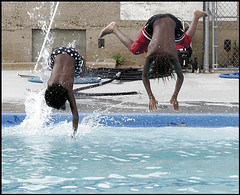Article anomalies
In "Program to Curb D.C. Auto Thefts Sputters: Staffing Rule Makes 'Bait Cars' Less Efficient Than Elsewhere," it appears that DC MPD lawyers require staffing requirements for "bait cars" to catch car thiefs infinitely more complicated and greater than that of other cities like Arlington County, VA and Minneapolis, which attribute to bait car programs, drops in auto theft of 30%-38%.
Why is the DC way better than other ways that are proven to work?
 Anacostia Pool, Washington,D.C.--PHOTOGRAPHER-MARVIN JOSEPH/The Washington Post. Thanks to a grant from Kaiser Permanente, D.C. public pools are free of charge for the remainder of the summer. PICTURED, Junior lifeguards, Robert Davis, 13, (left) and Jerrel Jones, 12, take a dive in the Anacostia Pool free of charge.
Anacostia Pool, Washington,D.C.--PHOTOGRAPHER-MARVIN JOSEPH/The Washington Post. Thanks to a grant from Kaiser Permanente, D.C. public pools are free of charge for the remainder of the summer. PICTURED, Junior lifeguards, Robert Davis, 13, (left) and Jerrel Jones, 12, take a dive in the Anacostia Pool free of charge.The story "In D.C., Everyone Swims Free-Style: $200,000 Grant Lets City Expand Gratis Use of Pools to Adults" makes this point:
"I went to my council member and said there has got to be a way to help families get free access to fitness and recreation," said Alicia Rucker, a D.C. mother of six who realized that for families like hers, paying $9 a day for admission makes swimming throughout the summer prohibitively expensive. "Back in the day, when I was coming up, the public pools were free, so we all went," said Rucker, once a champion swimmer for the East Capitol Sea Devils. "Now, if parents have to pay for it, not all of them are going to send their kids to the pool. I bet we'd have a lot fewer kiddie car thieves if the pools were all free."
Pool manager Sean Link said that when there was no admission fee before 1997, the Anacostia swimming pool was packed with about 400 kids every day. Since then, there have been a few neighborhood die-hards, but most visitors have been day campers who came to the pool in groups. "I can see the difference this year, after they made it free. The neighborhood kids came back, lots of them," Link said.
With the $300 million budget surplus, couldn't money be found to provide a greater number of "free" recreation options for DC youth?



0 Comments:
Post a Comment
<< Home